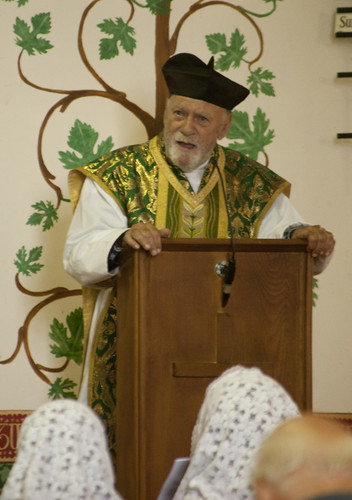 |
| Sign up for the LMS Latin Course with Fr John Hunwicke and Fr Richard Bailey here. |
First, the Victoria and Albert Museum are putting on an exhibition of English needlework from the Middle Ages, called 'Opus Anglicanum', The Guardian carried a story about it, noting
'for the first time in decades, the museum has dared to use Latin in an exhibition title.'
It explained:
“We were a bit worried that people would find the title baffling,” said co-curator and textile expert Clare Browne. “Older people thought that younger people would find it off-putting – but in fact younger people thought it was mysterious and exciting.”
This is a startling assertion, but only because it is so exactly what we have found in the movement for the Traditional Latin Mass. I could have said it myself.
The second is a report in The Economist about whether being a native English-speaker is an advantage in a world where English is increasingly the language of business. It reported some interesting and surprising advantages enjoyed by those working in English for whom English is not their cradle language.
Ingenious researchers have found that sometimes decision-making in a foreign language is actually better. Researchers at the University of Chicago gave subjects a test with certain traps—easy-looking “right” answers that turned out to be wrong. Those taking it in a second language were more likely to avoid the trap and choose the right answer. Fluid thinking, in other words, has its down-side, and deliberateness an advantage.
(I've found an article about this research here; the reseach paper itself is here.)
From about the 8th until well into the 17th century, almost all theology and philosophy in the West was done in a language at some distance, at least, from the cradle language of those involved: Latin. In theology, a great deal of work continued to be done in such a language into the 20th century. This had so many advantages that it is hard to know where to begin: the ability of people to discuss ideas in the same language across the many linguistic barriers of Europe; the ability of people to engage directly with writers from the distant past in a language equipped with all the necessary technical terms; the levelling of the playing-field between linguistic groups; all the educational advantages ascribed to bi-lingualism, plus the special advantages of learning an inflected, and linguistically influential language like Latin.
But in addition to these manifold advantages, it would seem that people doing their philosophy and theology in Latin would actually have been doing better academic work because of the dispassionate 'deliberatness' involved in talking and writing in a second language.
No wonder things went downhill after the loss of Latin as a working language for academics.
You can sign up for the Latin Mass Society's intensive five-day Latin course here.
Support the work of the LMS by becoming an 'Anniversary Supporter'.
You can sign up for the Latin Mass Society's intensive five-day Latin course here.
Support the work of the LMS by becoming an 'Anniversary Supporter'.
No comments:
Post a Comment